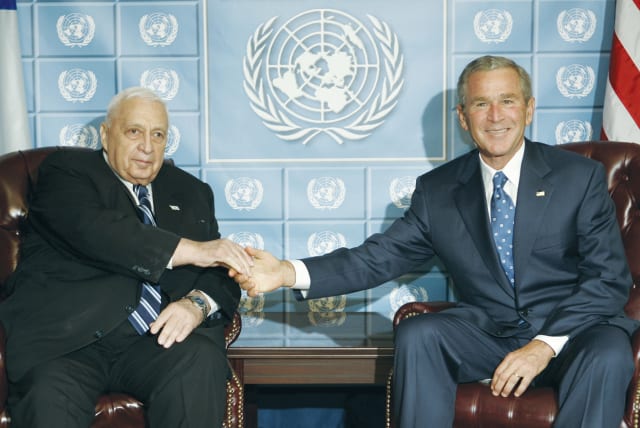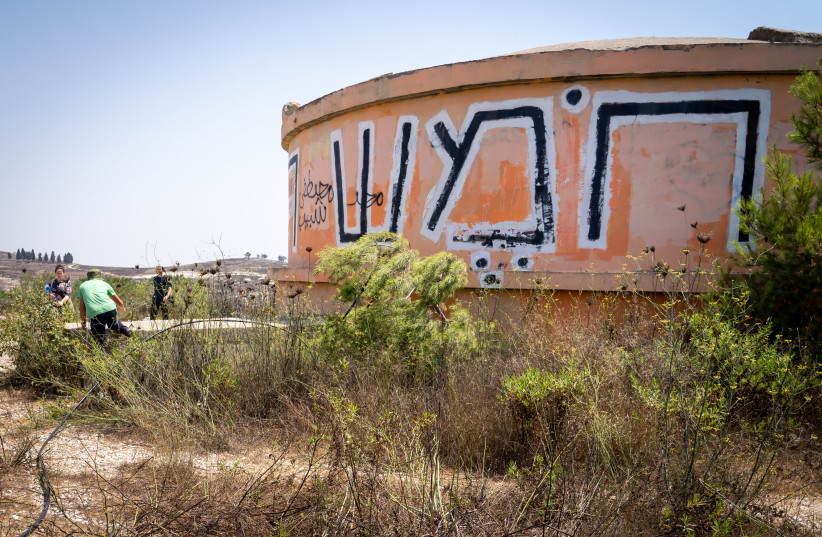Israel trashed US two-state hopes but did it violate the Bush agreement? - analysis

Bush’s Road Map, which Israel signed onto in 2002 with reservations, called on the Jewish state to freeze all settlement activity including what was needed for natural growth.
The Bush-Sharon agreement – does anyone even remember what that is?
When it comes to the 2004 exchange of letters between former prime minister Ariel Sharon and former US president George Bush, Israel believes that the White House voided those understandings at least 14 years ago.
One would be hard-pressed to find a US official since 2009 who has referenced or even spoken about them. For an example of diplomatic understandings forgotten on a dusty shelf or thrown into the dustbin of history, one need look no further than those letters.
So it was startling to hear US Ambassador Tom Nides and US State Department deputy spokesman Vedant Patel explain that Israel was in provocative violation of the understanding in those letters.
Patel spoke out after the Knesset, in the predawn hours of Tuesday morning, took the dramatic step of repealing the 2005 Disengagement Law as it applied to the four northern Samaria settlements destroyed under that plan.
Sharon had provided Bush in 2004 with details of that plan which primarily focused on the pullout from Gaza and the demolition of the 21 settlements there.
At the time, Israel considered the Bush-Sharon letters to be a highly significant diplomatic achievement. Sharon promised to evacuate 25 settlements, and in exchange Bush pledged that Israel could retain the settlement blocs in any two-state resolution to the conflict.
Bush wrote to Sharon that “in light of new realities on the ground, including already existing major Israeli population centers, it is unrealistic to expect that the outcome of final status negotiations will be a full and complete return to the armistice line of 1949, and all previous efforts to negotiate a two-state solution have reached that conclusion.”
Sharon’s plan was born at a time Bush was steering the resolution of the Israeli-Palestinian conflict away from the parameters set out by former US president Bill Clinton, which allowed for Israel to retain the settlement blocs. The exact location of those blocs was never defined.
Bush’s road map, which Israel signed on to in 2002 with reservations, called on the Jewish state to freeze all settlement activity, including what was needed for natural growth.
Sharon, who prided himself on being Israel’s mapmaker, set about unilaterally reformulating what he believed would be Israel’s final borders, to include many but not all of the settlements. First to go were the isolated Gaza settlements and the north Samaria communities considered to be unsustainable for security reasons due to the Second Intifada violence.
It was believed at the time that this was the first phase of what would be other withdrawals. The Bush letter was seen as the underpinning of that plan and was used to sell it to the Israeli public. If Israel couldn’t make peace with the Palestinians, perhaps it could settle the issue of its borders with the Americans.
For those who believed that settlements were a stumbling block to peace, the Disengagement was seen as a sign of hope that a two-state solution was in the offing, despite the absence of Israeli-Palestinian talks.
Hamas takes over Gaza and Obama kills the Bush-Sharon groundwork
Journalists from all over the world flocked to Gaza to cover Israel’s withdrawal, so they could be on hand for the historic moment when violence gave way to peace through a painful Israeli sacrifice.
Supporters of Disengagement saw it as a first step to ending the conflict, while opponents argued that territorial concessions would only strengthen terrorism.
What followed was a violent Gaza coup by Hamas, which has retained forced control of the Strip. Gaza has since been a launching pad for increasingly deadly and powerful rockets against Israel, which have sparked at least four wars.
The international community has largely blamed Israel for the Gaza violence, and there are few who mention or even remember that Israel destroyed 25 settlements in 2005 in the name of peace.
US support of Israeli retention of the blocs lasted less than four years.
Israel’s hope that Sharon had secured the blocs fell apart when former US president Barack Obama opted in 2009 not to affirm the Bush letter and pressed Prime Minister Benjamin Netanyahu to impose a 10-month moratorium on the construction of settler housing in all West Bank settlements. It was a freeze that did not distinguish, as Israel had tried so carefully to do, between the blocs and the isolated settlements. In so doing it effectively erased any distinction.
The final blow, however, was in 2016 when the Obama administration refused to block United Nations Security Council Resolution 2334, which deemed all settlements illegal.
The issue of the letter was irrelevant during former US president Donald Trump’s time in the White House, because his peace plan, unveiled in 2020, allowed for Israel to eventually apply sovereignty over all the settlements, whether they were isolated or part of the blocs.
But even that plan excluded the sites of these four former Samaria settlements and placed them within the borders of a future Palestinian state.
The politicians who pushed the Knesset legislation forward – chief among them Knesset Foreign Affairs and Defense Committee chairman Yuli Edelstein, Samaria Regional Council head Yossi Dagan and National Missions Minister Orit Struck – never accepted the Bush letter. Dagan, himself an evacuee from Sa-Nur, and Struck, a resident of Hebron, worked as activists to prevent Disengagement. Edelstein was among a group of Likud parliamentarians who opposed Disengagement.
They worked almost from the start to repeal the legislation and to undo what they consider to be a historic mistake. Netanyahu himself has long been blunt about his belief that territorial concessions do not bring about peace.
The US narrative about the Sharon-Bush letter
The last thing the Israeli Right worried about or even considered was the Bush letter, which it never supported and which it long ago believed was irrelevant.
The United States’ narrative around the letter differs from Israel’s. Prof. Dan Kurtzer, who was the US ambassador at the time, explained that the letter was “specifically” ambiguous “because the Bush administration was not ready to unilaterally recognize settlement centers or blocs or settlements for that matter.
“Fast-forward the clock, and Israel says the US pushing us to do a settlement freeze is a violation of the letter; it’s not. It has nothing to do with the letter.
“The Israelis know that; they just do not want to admit it. That letter did not accomplish all that they wanted; it accomplished some of what they wanted,” he said.
The last time Kurtzer could recall conversations around the Bush letter was in 2009 when Obama rejected Israel’s request to reaffirm the letter “according to Israel’s interpretation.”
“That’s when Israel accused the US of backing away, because they didn’t like the fact that the letter did not say what they were interpreting it to say,” he said.
The Disengagement repeal, however, is not the only time that Israel has violated the Sharon-Bush understanding. In those letters, Sharon promised to evacuate the outposts. It’s a pledge that Netanyahu has not upheld. When he announced the authorization of nine outposts last month, the US did not accuse him of violating the Sharon-Bush understandings.
So why bring it up here, now, after so much time?
Israel sat on Sunday as part of the “Quintet” – along with the United States, Jordan, Egypt, and the Palestinian Authority – in Sharm el-Sheikh and affirmed its commitment not to make announcements about new settlement activity.
It did so as part of a regional effort to ensure the peaceful passage of Ramadan, which began on Wednesday and which overlaps Passover and Easter.
At Sharm el-Sheikh, it agreed to engage in a process that would lay the basis for future negations with the Palestinians. The Biden administration publicly touted the progress, noting that this was the most advanced dialogue that had occurred since US-led talks broke down in 2013.
The PA said that talks had begun with the Israelis. Then, in a private event in Paris on Sunday night, Finance Minister Bezalel Smotrich said there was no such thing as a Palestinian people.
Early Tuesday morning, the Knesset voted to repeal Disengagement as it applied to northern Samaria.
Israel withdrew its military from Gaza in 2005, but it did not withdraw from the sites of the four evacuation settlements. They remained a part of Area C of the West Bank, which is under Israeli military and civilian control.
For right-wing Israelis, the Disengagement repeal was a symbolic step toward healing a divisive and national traumatic event. It fed their hope of enveloping all of Area C within the final borders of their state and of one day returning to Gaza.
But it was also a symbolic step for the international community and the Left, showing that Israel was actively rescinding its past pledges toward a two-state solution. The four evacuated settlements were located deep within territory that the international community believes will be part of a Palestinian state. Israeli construction there would make any contiguous Palestinian territory impossible.
The issue is likely not whether Israel technically violated the Bush-Sharon agreement, because that will remain a matter of endless debate.
The Knesset repeal of Disengagement, even with its slim vote of 31-18, out of 120 seats, was a clear disavowal of the two-state solution. In rejecting it, the Knesset also diminished a seminal memory for two-state supporters when peace was just around the corner.
Sharon, in his letter to Bush, had unequivocally pledged to evacuate 25 settlements and to support two states. Then on Tuesday, Israel violated those pledges.US President Joe Biden has been the first president in decades not to immediately pursue an Israeli-Palestinian peace plan, but his administration has persistently spoken of the importance of holding that option open.The Knesset on Tuesday might have taken a step to assuage a national trauma, but it also trashed the small shards of US and Palestinian hopes for a two-state peace process, just as it seemed that progress was possible.
Jerusalem Post Store
`; document.getElementById("linkPremium").innerHTML = cont; var divWithLink = document.getElementById("premium-link"); if (divWithLink !== null && divWithLink !== 'undefined') { divWithLink.style.border = "solid 1px #cb0f3e"; divWithLink.style.textAlign = "center"; divWithLink.style.marginBottom = "15px"; divWithLink.style.marginTop = "15px"; divWithLink.style.width = "100%"; divWithLink.style.backgroundColor = "#122952"; divWithLink.style.color = "#ffffff"; divWithLink.style.lineHeight = "1.5"; } } (function (v, i) { });


